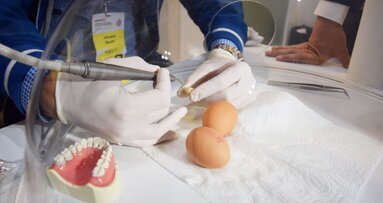LONDON, UK: The discussion around a link between periodontitis and hypertension is not new. Acknowledging this and the fact that there is still not enough evidence to establish a causal connection, authors of a recent study which investigates the correlation believe that more randomised tests are needed to determine the impact of periodontal therapy.
In the meta-data study, a team of scientists from University College London (UCL) Eastman Dental Institute examined the results from a total of 81 papers from 26 countries to see whether there was a clear connection between periodontitis and hypertension. Speaking about the results, lead author Prof. Francesco D’Aiuto of the periodontology unit at UCL said, “We observed a linear association—the more severe periodontitis is, the higher the probability of hypertension. The findings suggest that patients with gum disease should be informed of their risk and given advice on lifestyle changes to prevent high blood pressure such as exercise and a healthy diet.”
Despite this connection, D’Aiuto believes that the treatment process is more complex than just periodontal therapy. In the results, it showed that only five out of 12 interventional studies included in the review had a reduction in blood pressure after periodontal treatment and that changes occurred even in people with healthy blood pressure levels.
“The evidence suggesting periodontal therapy could reduce blood pressure remains inconclusive. In nearly all intervention studies, blood pressure was not the primary outcome. Randomised trials are needed to determine the impact of periodontal therapy on blood pressure,” explained D’Aiuto.
However, despite the jury still being out on the effects of periodontal therapy on patients with hypertension, periodontitis is still affecting more than 50% of the world’s population and high blood pressure is the leading cause of premature death. With this in mind, D’Aiuto noted that it was prudent to provide oral health advice to those with hypertension.
The study, titled “Periodontitis is associated with hypertension: A systematic review and meta-analysis”, was published online on 24 September 2019 in Cardiovascular Research, ahead of inclusion in an issue.
Tags:
BELFAST, UK: Aimed at reducing childhood caries levels in the region, the Northern Ireland Caries Prevention in Practice Trial (NIC-PIP) has been ...
LONDON, UK: Body mass index (BMI) and obesity have been associated with the prevalence, extent and severity of periodontitis by a number of studies. Now ...
LONDON, UK: By providing a sweet taste without the calories and other deleterious side effects of sugar, artificial sweeteners have often been lauded for ...
As a researcher at the University of Brescia in Italy and the operator of a private practice, Prof. Magda Mensi has a special interest in the non-surgical ...
COVID-19 has had a significant impact on our professional life, yet the aftermath of the pandemic and its consequences for our future are still unclear. ...
Although orthodontic treatment has become increasingly commonplace, its periodontal side effects are often overlooked. In a free CURADEN webinar on Tuesday,...
LONDON, UK: Though the exact number of people who suffer from xerostomia is unclear, some studies estimate that as many as one in five of the population ...
LONDON, UK: With NHS trusts in crisis all over Britain, new estimates by Newcastle University’s Centre for Oral Health Research have indicated that a ...
LONDON, UK: For periodontal treatment, modern Er:YAG lasers have proven to not only eliminate inflamed tissue, but also to preclude the risk of bacteraemia ...
LONDON, UK: For periodontal treatment, modern Er:YAG lasers have proven to not only eliminate inflamed tissue, but also to preclude the risk of bacteraemia ...
Live webinar
Tue. 24 February 2026
6:00 pm UTC (London)
Prof. Dr. Markus B. Hürzeler
Live webinar
Tue. 24 February 2026
8:00 pm UTC (London)
Prof. Dr. Marcel A. Wainwright DDS, PhD
Live webinar
Wed. 25 February 2026
4:00 pm UTC (London)
Prof. Dr. Daniel Edelhoff
Live webinar
Wed. 25 February 2026
6:00 pm UTC (London)
Live webinar
Thu. 26 February 2026
1:00 am UTC (London)
Live webinar
Tue. 3 March 2026
4:00 pm UTC (London)
Dr. Omar Lugo Cirujano Maxilofacial
Live webinar
Wed. 4 March 2026
1:00 am UTC (London)
Dr. Vasiliki Maseli DDS, MS, EdM



 Austria / Österreich
Austria / Österreich
 Bosnia and Herzegovina / Босна и Херцеговина
Bosnia and Herzegovina / Босна и Херцеговина
 Bulgaria / България
Bulgaria / България
 Croatia / Hrvatska
Croatia / Hrvatska
 Czech Republic & Slovakia / Česká republika & Slovensko
Czech Republic & Slovakia / Česká republika & Slovensko
 France / France
France / France
 Germany / Deutschland
Germany / Deutschland
 Greece / ΕΛΛΑΔΑ
Greece / ΕΛΛΑΔΑ
 Hungary / Hungary
Hungary / Hungary
 Italy / Italia
Italy / Italia
 Netherlands / Nederland
Netherlands / Nederland
 Nordic / Nordic
Nordic / Nordic
 Poland / Polska
Poland / Polska
 Portugal / Portugal
Portugal / Portugal
 Romania & Moldova / România & Moldova
Romania & Moldova / România & Moldova
 Slovenia / Slovenija
Slovenia / Slovenija
 Serbia & Montenegro / Србија и Црна Гора
Serbia & Montenegro / Србија и Црна Гора
 Spain / España
Spain / España
 Switzerland / Schweiz
Switzerland / Schweiz
 Turkey / Türkiye
Turkey / Türkiye
 UK & Ireland / UK & Ireland
UK & Ireland / UK & Ireland
 International / International
International / International
 Brazil / Brasil
Brazil / Brasil
 Canada / Canada
Canada / Canada
 Latin America / Latinoamérica
Latin America / Latinoamérica
 USA / USA
USA / USA
 China / 中国
China / 中国
 India / भारत गणराज्य
India / भारत गणराज्य
 Pakistan / Pākistān
Pakistan / Pākistān
 Vietnam / Việt Nam
Vietnam / Việt Nam
 ASEAN / ASEAN
ASEAN / ASEAN
 Israel / מְדִינַת יִשְׂרָאֵל
Israel / מְדִינַת יִשְׂרָאֵל
 Algeria, Morocco & Tunisia / الجزائر والمغرب وتونس
Algeria, Morocco & Tunisia / الجزائر والمغرب وتونس
 Middle East / Middle East
Middle East / Middle East

















































To post a reply please login or register